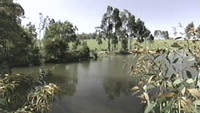Broadcast 6.30pm on 20/10/2004 http://www.abc.net.au/gnt/future/Transcripts/s1223971.htm
 |
|||||
| Harry and Lyn Croll found a natural spring on their
property which changed the way they managed their farm |
|||||
GEORGE NEGUS: Well, speaking of crises, as we've been
reminding you all week, for years now, large parts of this country have been
suffering a serious water shortage. But Andrea Ulbrick came across one property
in rural Victoria that's got absolutely no water problems whatsoever.
ANDREA ULBRICK, REPORTER: While much of Australia is in the grip of one of the
worst droughts on record, on this property in Gippsland water is literally
coming up out of the ground.
HARRY CROLL: It used to be a lot lower and it was all reeds and swamp. We
found that this big area that had to be an acre or more is just one big spring.
ANDREA ULBRICK: A natural spring?
HARRY CROLL: Yeah.
ANDREA ULBRICK: And it was this natural spring that changed the way Harry and
Lyn Croll are managing their farm today. When they first arrived on their
65-hectare property 32 years ago they had to find a way to stop the constant
flooding.
HARRY CROLL: The original job on the farm was to stop flooding. So you put, in
the dams, the pipes in so that there's a retardation effect right through. By
doing that, then you get to use the water as you want it.
ANDREA ULBRICK: So it's all about management?
HARRY CROLL: That's right. Instead of getting one big flood, you control it.
ANDREA ULBRICK: The first spin-off meant that the problem of salinity was simply
washed away.
HARRY CROLL: One of the reasons I bought it was because I thought I could fix
the salting.
ANDREA ULBRICK: And what did you pay for the property?
HARRY CROLL: $45,000.
ANDREA ULBRICK: Right. So that kind of makes sense.
HARRY CROLL: And they were glad to get out of it.
ANDREA ULBRICK: And it didn't take long for the Crolls' property to become a
haven for bird life.
LYN CROLL: Usually we've got the pair of swans and the babies that they have for
the year, and they've got five this year. The swan used to sit in there each
year, so I used to go and sit for her... with her and feed her. And she taught
me the language, so I know some of their calls.
ANDREA ULBRICK: Really? So you can speak swan language?
LYN CROLL: A little bit, yes.
ANDREA ULBRICK: Can you... can we hear a little bit of the swan talk?
LYN CROLL: Oh, I just call out... (Imitates swan call) And that means come on.
ANDREA ULBRICK: And she'd come to you when you did that?
LYN CROLL: Yes, yes.
ANDREA ULBRICK: Besides the immediate health benefits of conserving so much
water, Harry has also been able to run the farm without traditional chemicals.
HARRY CROLL: I don't spend anything on fertiliser because it comes naturally
with the water. I don't have to have any diesel to pump the water out.
ANDREA ULBRICK: But the most unexpected bonus has been the success of Harry's
latest passion. In 1994, his gelding State Taj took out one of the racing
world's most prestigious prizes.
HARRY CROLL: We got invited to race at Hong Kong in the Hong Kong International
Cup, all expenses paid. So we went over there and he won. The horses seem to
grow big and strong out there at the farm and I think that might have had
something to do with it. It's very relaxing out there and the horses are
relaxed.
ANDREA ULBRICK: Why are you and Lyn so obsessed with water?
HARRY CROLL: Well, I'm an Aquarius. I've always played in water. You got to work
with the environment and don't force things. Work with it, never against it
'cause everything seems to have a place. Work with nature, you just live longer.
LYN CROLL: Yes.
HARRY CROLL: And...and...
LYN CROLL: Keeps you healthy.
HARRY CROLL: Keeps you healthy and wise.
LYN CROLL: And you have the right outlook.
GEORGE NEGUS: Since we put that story together some time back now, Harry's
passed away, but it was fine with his family that we should honour him with that
story.